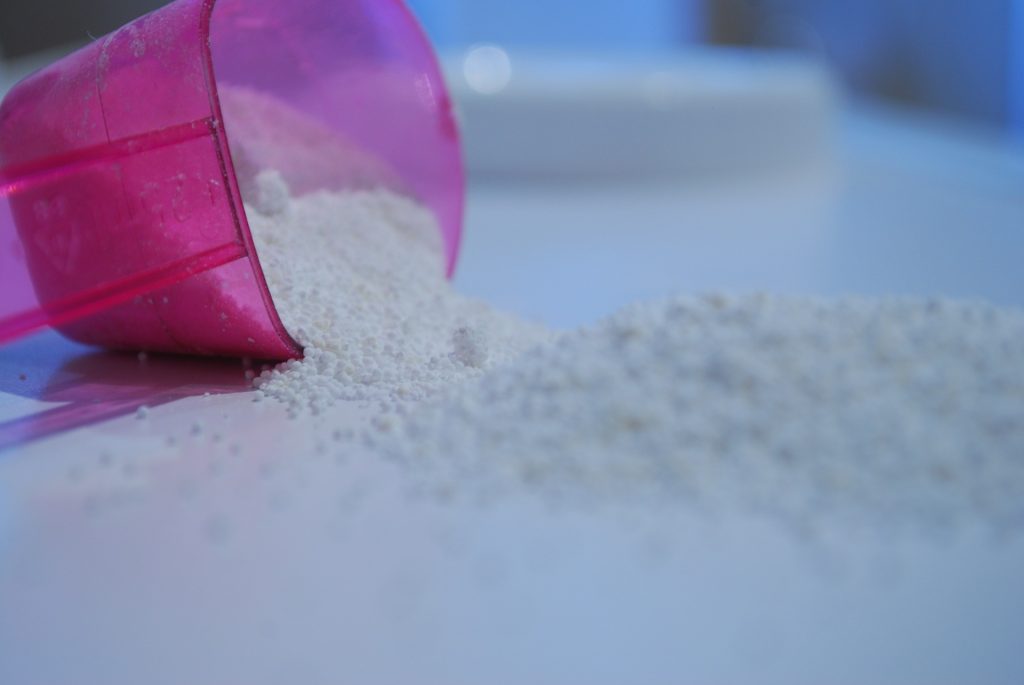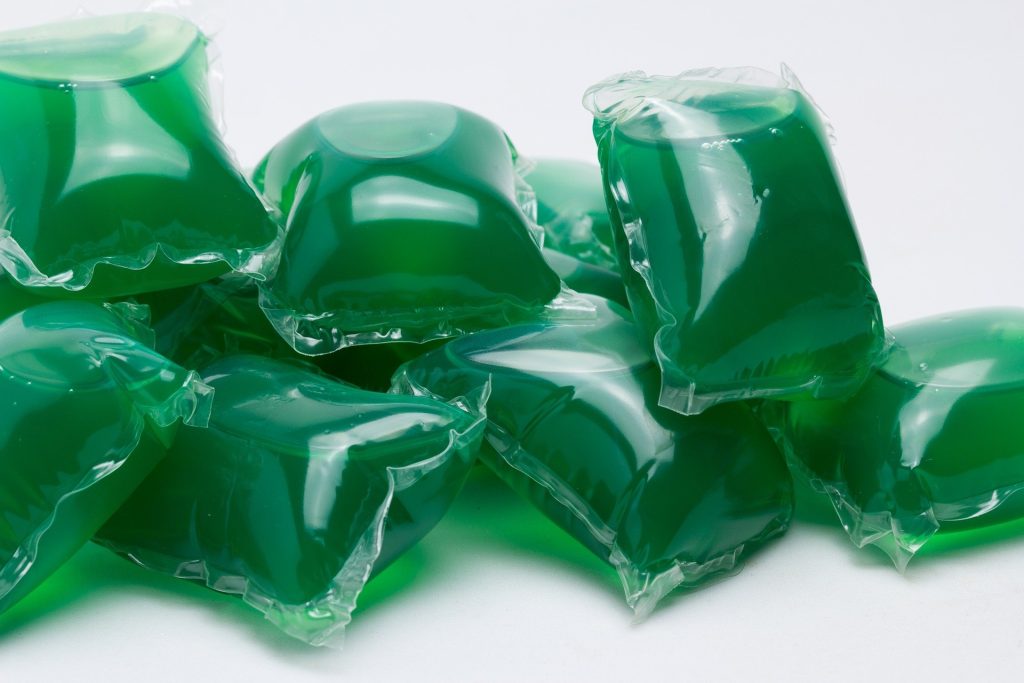Washing clothes is something everyone has to do, and a washing machine is a time-saving appliance that does the work for us. The only thing you really need to do is choose a suitable detergent to go with your clothes in the wash.
With an array of options on the market, choosing the right detergent for your washing machine load is actually more important than you think if you want your clothes to last.
In this article we’ll be taking a look at how you can choose the right detergent for your needs, budget and personal preferences.
Which washing detergent is best?
A huge variety of detergents are available to buy, ranging from powders to eco-detergents, so it’s easy to get confused. Let’s take a look at the pros and cons of the big four: powder, capsules, liquids & gels, and washing tablets.

Powder washing detergents
Pretty much all washing machines come with a drawer for inserting detergent, often carrying a power specific portion of the drawer.
- Powders have long been a staple in many homes, coming in both bio and non-bio formats to provide excellent cleaning
- Easy to measure exactly how much you need
- You can buy this detergent type in bulk, making it slightly cheaper than the rest
- A drawback is the mess that powder can make. It creates a gunky residue that can cling to and harden on the inside of the drawer, so you’ll need to clean this out regularly to maintain your washing machine
- Quite bulky, so takes up more room to store in the home
Washing detergent capsules
Similar in their contents to a liquid or gel, but packaged to make things as simple as possible.
- Compact packaging
- No chance for mess or spills
- No measuring is required – simply place a capsule in the wash, and you’re ready to go
- Some concerned consumers have pointed out that young children may mistake these for sweets – something parents should consider when storing and using these items.
Liquid & Gel Detergent
With high standards of performance and less hassle to use, it’s easy to see why liquids and gels have grown in popularity.
- Great for low temperature washes or short washes, as they don’t need to dissolve which means that they get to work more quickly
- Easy to use as a spot treatment to dab onto a persistent stain
- Most washing machines won’t allow you to store liquid for pre-wash and main wash, meaning you have to revisit your machine to top up
- Can drip and get messy when pouring

Washing Tablets
Tablets are simply a compressed powder, which you place in the drawer.
- Less messy than loose powder
- Deliver a pre-measured dose for the washing machine
- Compact and easy to store
- Not ideal for quick washes, as they require more time to dissolve down into the water
- Though less messy than loose powder, they can still leave residue which will require cleaning
Should I choose bio or non-bio?
One of the biggest decisions, and one which often confuses some people, is whether you should be using biological or non-biological washing detergents.
The simple answer is that the choice is a personal one. Biological washing products contain enzymes which help in the natural breakdown of stains and muck such as oil, starch and blood. Not only that, but it allows you to select a lower temperature for your wash.
However, biological agents can often prove irritable for those with sensitive skin. In this instance, non-bio products are preferable, but require a warmer wash to tackle any heavily soiled clothes. Most brands should state quite clearly which type their detergent is on the packaging.
Do I need different detergents for white and colours?
Ideally, yes. Non-bio detergents contain oxygen bleach and these are typically used for white clothing. To use these on coloured or darker clothing could cause them to fade faster. Check the labels, because you may wish to choose different detergents for different colours of load.
To keep your clothes in the best possible condition, whatever the colour, always take a look at your laundry care symbols on the label – also check out our guide to choosing the right washing machine temperature.
Why you should separate your whites from your dark and coloured clothing
Simply put, the dye from coloured or darker clothing can leak out during a wash. Therefore, if you have paler colours thrown in the mix, the dye can discolour them – meaning your white t-shirt could end up pink or a muddy colour you don’t want.
What fragrance should I choose?
A key consideration for many people, the smells of a detergent on clothes can be a dealbreaker. This is all down to personal preference of course, with smells ranging from the standard lavender, to the exotic lime and hibiscus scent.
If your washing machine needs repair, maintenance or replacement, our experts can help. Domex is an award-winning kitchen appliance repair company, specialising in washing machine repairs across London, Epsom, Guildford and Brighton. Get in touch to discuss your issue today.
Washing clothes is something everyone has to do, with the washing machine proving itself to be a timesaving appliance when it comes to this chore. The only thing you really need to do is choose the right detergent to go with your clothes in the wash.
With this in mind, this month we’ll be taking a look at how you can choose the right detergent for your needs, budget and personal preferences.

Bio or Non-Bio?
One of the biggest decisions, and one which often confuses some people, is whether you should be using biological or non-biological washing detergents.
The simple answer is that the choice is a personal one. Biological washing products contain enzymes which help in the natural breakdown of stains and muck such as oil, starch and blood. Not only that, but it allows you to select a lower temperature for your wash.
However, biological agents can often prove irritable for those with sensitive skin. In this instance, non-bio products are preferable, but require a warmer wash to tackle any really soiled clothes.
Most brands should state quite clearly which type their detergent is on the packaging.
Powders
Pretty much all washing machines come with a drawer for inserting detergent, often carrying a power specific portion of the drawer. Powders have long been a staple in many homes, coming in both bio and non-bio formats to provide excellent cleaning. You can buy this detergent type in bulk too, making it slightly cheaper than the rest.
The one drawback of this is the mess powder can make. Creating a gunky residue or even simply clinging and hardening to the inside of the drawer, you’ll need to clean out the drawer regularly to maintain your washing machine if you use powders.
Liquids & Gels
With high standards of performance and less hassle to use, it’s little wonder that liquids and gels have grown in popularity. These types of detergents are also great for low temperature washes due to the fact that they can get to work more quickly.
Tablets
Tablets are simply a powder. You are still required to put them in the drawer and they can still leave residue which will need cleaning, they are simply making control over how much you use easier and reducing the risk of spilling loose powder.
Capsules & Liquid Pockets
Similar in their contents to a liquid or gel, but packaged to make things as simple as possible. Simply throw these in with your wash and you’re away. The only downside, according to some concerned consumers, is that young children mistake these for sweets – something parents should consider when storing and using these items.
Choosing a fragrance
A key consideration for many people, the smells of a detergent on clothes can be a dealbreaker. This is all down to personal preference of course, with smells ranging from the standard lavender, to the exotic lime and hibiscus scent.
If you’re washing machine isn’t utilising the power of your detergent, your drawer is broken or jammed, or if you find your washing machine smells despite the use of fragrant products, look no further than Domex.
 My Repair
My Repair Book a Repair
Book a Repair